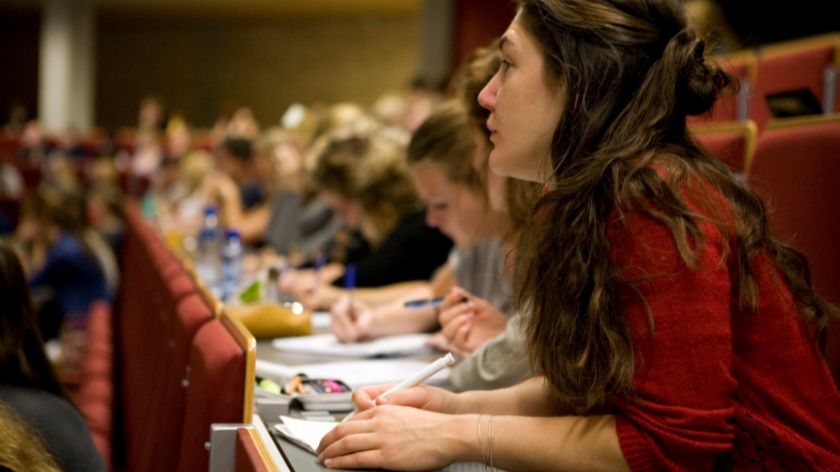For vulnerable lecturers and students, fear of covid has not disappeared yet
-
 Foto: Anoek Bleumer
Foto: Anoek Bleumer
Since last Friday, there is no longer a limit on the maximum number of students in a lecture hall. Not all students and lecturers are happy about that. ‘If not all students are vaccinated, I prefer to talk online.’
When the corona restrictions were eased last September, Vitória Piai thought it was too soon to go back to physical lectures. The psychology lecturer a serious medical history – between 2002 and 2004 she was successfully treated for cancer. Even though she was cured, she still has some strange ailments from time to time.
Half a year later, Piai is still being cautious, be it a bit less than in September. Because all colleagues in her research group are vaccinated and have taken a booster shot, she dares to have meetings with her lab group. But students are only welcome to have a talk in Piai her office if they are fully vaccinated. ‘If that is not the case, I prefer to talk online.’
Selfish
Piai does give physical lectures again, but she wears a facemask. ‘I do that for extra protection, but also as a signal to others,’ she says. ‘People are selfish. They think of their own discomfort first, but forget that we all do this for each other as well.’

Since last Friday, lecturers halls have returned to their full capacity and from this Friday wearing a facemask on campus will no longer be mandatory. Piai expects it’s a matter of time before she is infected with covid. ‘If it has to happen, I prefer it to be now, while the booster shot is still effective,’ she says. ‘But again, I think we are responsible for the protection of vulnerable students and lecturers.’
Big leap
It is not just Piai that has mixed feelings about the recent easing of the covid restrictions. Master’s student of law Marian Plohr (26) thinks the government is taking a very big leap with the easing. ‘I do understand that more students are welcome in the lecture halls,’ he says. ‘But to go from 75 students in lecture halls to 250 students, I find a bit much.’
The student of law, who is not ill and not a caregiver, remembers the easing at the start of the academic year. ‘A few months later we got a strict lockdown,’ he says. ‘I hope that does not happen again. I think it is smarter to ease the restrictions gradually, but it is what it is.’
Student advisor
It is an employer’s duty to ensure a safe work environment, is Marijtje Jongsma of union of education AOb her reaction to the lecturer and student their concerns. ‘Employees on the other hand are required to do their work in the best possible way. But that doesn’t mean they have to be on campus physically. Reasonableness and customisation are important. You need to prevent people saying: we are doing everything physically and you are expected to be on campus.’
‘You need to prevent people saying: we are doing everything physically and you are expected to be on campus’
Radboud University is aware of this, says university spokesman Martijn Gerritsen. ‘Of course, we are delighted to have more possibilities with the easings, but we also need to keep in mind there are students and employees who are now even more concerned,’ he says.
There are no real regulations for students and lecturers who are in this situation. Gerritsen points out that students who are worried about their study progress should come into contact with their student advisor. Employees with similar concerns can talk to their supervisor.
Long covid hotline
Union of education AOb recently opened a hotline for employees with long covid. ‘In a week’s time, we have received almost 700 reports nationally,’ says Marijtje Jongsma. ‘Think of employees who have been sick at home for almost a year and are worried about being fired. But also, employees with a temporary contract who are forced to (partly) stay at home because of long covid. Little is known about long covid: nobody knows when you can expect people to be completely cured. Give those who need it extra time, so they can get better and reintegrate.’



